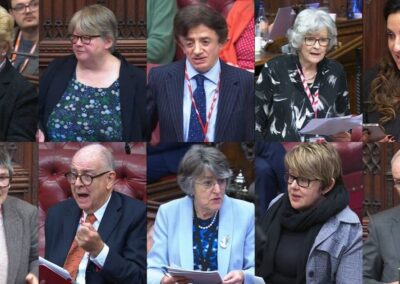Hundreds of hospice beds have been cut across England, and the majority of hospices are now operating in deficit, according to a major report – raising serious criticism that while palliative care services are undergoing a financial crisis, Parliament has committed to ensuring assisted suicide receives the financial support needed for its implementation, should it become legal.
Released last week, a National Audit Office (NAO) report has shown that almost two-thirds of England’s independent adult hospices were in deficit in 2023/24. The report states that the independent adult hospice sector spent approximately £78 million more than its income, resulting in service withdrawals, reduced numbers of hospice beds, and staff cutbacks. By the end of 2024, around 300 inpatient beds were said to be “deregistered or withdrawn from operation”.
The report also said the Department of Health and Social Care and NHS England were unaware “how reliant they are on the [independent adult hospice] sector”, because they “do not know what proportion of the total amount of palliative and end-of-life care provided in England is delivered by the independent adult hospice sector”.
The report found that the financial difficulties are coming at the same time as “[d]emand for adult palliative and end-of-life care is projected to rise in coming years”.
Responding to the report, Sam Royston, executive director for research and policy at Marie Curie, said “The NAO report echoes what we witness every day: palliative and end-of-life care is in crisis”.
The Guardian raised concerns about assisted suicide being introduced alongside underfunded hospices. Describing the report as “dismal news” in an editorial, they said “The prospect of a state-funded assisted dying service sitting alongside a cash-strapped hospice sector is deeply disquieting”.
Baroness Berger said the report “should concern us all”.
“Hospice funding has fallen in real terms by nearly 10% over the past 2 years, with hospices cutting both jobs and services. How can we consider assisted [suicide] when the crisis in palliative care means so few people face a real choice?”, she added.
Concerns shared about assisted suicide provided alongside struggling hospice sector
However, speaking during the second session of the Terminally Ill Adults (End of Life) Bill select committee in the House of Lords, Professor Mumtaz Patel, President of the Royal College of Physicians (RCP), one of the largest medical royal colleges, shared her fears that people could choose assisted suicide because of lack of palliative care provision and inequity of services.
“What I really fear is that people are making, sometimes, these choices because of the lack of provision around good palliative care. Going back to the inequity of services, it feels really wrong and a lot of our members and fellows talk about that. Just where the disadvantaged populations are, there is service underprovision and then that inequity and gap is just going to get wider and wider” she said.
Concerns about underfunding in the palliative care sector alongside assisted suicide had been raised when Parliament granted a “blank cheque” for Kim Leadbeater’s assisted suicide Bill, leading to an outcry from MPs.
Sir John Hayes MP, in particular, focused on the vague wording of the resolution saying the Bill’s sponsor “says that this is not a blank cheque, but you can’t get much more blank than that, can you? Essentially, any monies associated with the Bill – if it becomes an Act – will be provided”.
“[W]e have to ask the question”, he went on, “where will that money come from? Presumably it can come only from existing resource, and one assumes palliative care”.
“Palliative and end-of-life care is in crisis”
The news about the hospice cuts comes as palliative care services are in crisis, with Marie Curie reporting that 100,000 people are dying each year in England needing palliative care but not receiving it. Their analysis also shows that by 2048, the number of people with palliative care needs in the UK will climb by more than 147,000 to over 730,000.
Spokesperson for Right To Life UK, Catherine Robinson, said “As this report indicates, we could soon be in a position where state assistance in suicide is fully funded and provided for, but palliative and other end-of-life care is patchy or even unavailable altogether because of serious financial difficulties. This would be a disaster and a deeply cruel position for the state to leave us in. It would indicate an ideological commitment to facilitating suicide and against facilitating living”.
“Even supporters of assisted suicide should recognise the deeply perverse incentives such a system would create. In light of this report, Peers who are unsure about the assisted suicide Bill must reject it”.












